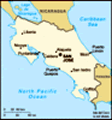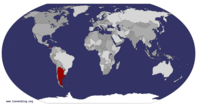Advertisement
Published: October 6th 2009

 Volcano Concepcion
Volcano Concepcion
One of two volcanoes that make up Isla de Ometepe in the middle of Lake Nicaragua.We could tell right away something was horribly wrong by the way people were running toward the gate. The intense movements of every muscle, every arm and leg, bespoke catastrophe. We were a hundred yards away, on the shores of Isla de Ometepe, just getting out of the warm waters of Lake Nicaragua after an afternoon swim underneath the smoking backdrop of Volcano Concepcion. I thought to myself, You only see people move that quickly just before the paramedics show up.
Therein lay the biggest problem. There aren't paramedics on Isla de Ometepe.
Our small group of Americans warily jogged over to the metal bars that marked the entrance to the grounds where we were to stay that night. There were already half a dozen onlookers in a circle around a body on the ground, just inside the gate. My friend Mario, who is Nicaraguan but was born in the United States, quickly inquired to the closest onlooker about what had just happened.
A man, a security guard employed by the hotel, lay unmoving on the ground, the only clue he lived were the ungodly moans uttered from a deep pain, even though his eyes were closed. After a few brief whispers, Mario thanked the man, walked over to us and gave us the news.
“So, they were pulling that cart up the hill in that little ATV, I guess they store it at the top of the hill.” Mario was pointing to what looked like a taco truck trailer, fifteen feet long, with two tires and a trailer hitch at the front. It looked like it weighed as much as a car. “The trailer broke away, and rolled all the way down the hill. This guy was at the bottom here, didn’t see it, and it hit him at full speed and pinned him up against this wall.” Again, we looked to where Mario’s eyes looked. A rock wall, five feet thick, sat at the entrance to the gate. It served double duty as a decorative façade for the entrance to the grounds as well as serving as a base for the metal bars of the ten-foot tall fence. Mario continued, “these people all rushed over, and it took six of them to push the cart off of him. He hasn’t said a word, and they think he’s unconscious…except for the moaning.”
My wife is a nurse and speaks a little Spanish, and so approached the man. She opened his eyelids with a thumb and took the man’s pulse at the wrist. She said a few words in Spanish to try and get him to respond, but the dark-skinned, black-haired little man just moaned with every exhale. Alisa looked up at me briefly, and from the quick flitting of her eyes, I knew right away the guy was in some serious trouble.
Meanwhile an animated conversation was taking place in lighting Spanish a few yards to the side of where the man lay. I recognized the owner of the hotel speaking loudly to two other men. One was the other security guard and the other man was no one I had seen before. They were pointing toward Concepcion, which was the direction of the port we had arrived at on a ferry earlier that day. Another man pointed West, straight across the lake, where Chad and I had just taken a swim at sunset. Mario wandered over there and engaged the three men in that Nicaraguan Spanish that drops the endings off most words, as if it were too hot and they couldn’t be bothered with it.
Then, from the top of the hill a tall white man with a thin beard came jogging down the manicured lawns. He assessed the situation and said in both Spanish and English, “I am a doctor from Europe.” He too knelt at the man’s side and as he went about checking the man’s vitals exactly as my wife had done I thought to myself, This poor guy chose a good day to get hurt, with a doctor and nurse staying the night.
The rest of us stood around with that nervous, worthless feeling people get when confronted with an emergency only to find they don’t have any of the necessary skills to deal with it. I kept waiting for a truck to arrive, there sure wasn’t going to be an ambulance coming way out here, on an island in the middle of Central America.
After arriving on a ferry earlier in the day, our group of twelve adventurers had spent the majority of the afternoon in our enormous touring van creeping along the gravely, unpaved roads of Isla de Ometepe. We were used to the van by now, and the roads. So as SUVs and Jeeps full of tourists sped by us, we sweat our way at ten miles an hour for three hours to get to the South side of the island. But we were in good spirits. We had already successfully navigated our way through Managua, to Cruzero, to San Juan del Sur, to the waters of Lake Nicaragua and the double volcano island of Ometepe. Life in the van was a slow, scorching, cramped one, but it beat life back in the States by the nautical miles that separated it.
It was Spring Break, and my wife, Alisa, and I were using this trip as a trial run for our planned sabbatical to Central and South America, slated to begin at the end of that summer. We were making plans to take a year off to learn Spanish. I had already given notice at the high school where I taught and she was in the midst of writing her letter of resignation at the hospital. Nicaragua was a trial run—a quick snapshot of the life that awaited us in six months. As it turned out, it was more educational than we had bargained for.
The doctor had established that the center of the man’s injury was around his hips, not because the man told him, but because the doctor’s gentle hands caused an increase in the deep moans every time he probed that area. The doctor also spoke to a couple of the men and women who were first on the scene and verified that he seemed to be pinned against the wall in the groin area. At no point did the doctor take his hand away from the man’s wrist, squeezing his pulse as if his grip alone could slow the onset of what we all thought was coming.
Meanwhile, the group of men discussing the situation behind the doctor, which now included Mario, were talking even louder. For the fiftieth time that trip I said to myself, Damn I need to learn Spanish!
Hot in the face, Mario came back to our group of travelers and filled us in again. “These guys are deciding if they should take him to the clinic by the ferry, or just put him in a speed boat and take him straight to the hospital in Rivas.” Mario pointed across Lake Nicaragua to a distant shore, only visible because night was arriving and lights dotted the horizon. Lake Nicaragua is the largest fresh water lake in the Americas, as can be seen on any map. The ferry ride had taken an hour and a half.
“Well, what are they waiting for?” Mario’s girlfriend Lisa asked. “Jesus, it looks like that guy is going to die!”
“Yeah, they better get a move on,” I said. “Where’s the car? Do they have a boat?”
“Well…” Mario began, but was drawn back to the argument. Something was bothering him.
Twenty minutes passed. The man on the ground was getting worse. By now the doctor had engaged the arguing men two or three times, and even I could tell he was pleading with them to hurry. But every minute that passed found neither truck nor boat arriving on the scene. Mario seemed to get angrier with every word they said until it looked as if he might get into an altercation with the owner of the hotel.
Finally a truck arrived. We put the unconscious man on a mattress in the back bed of the truck, to minimize the jolting. It was something the rest of us could help with, and it felt good to finally be able to do something. The truck drove down to the shore, where we waited another excruciating twenty minutes before another Nicaraguan arrived in a little speed boat. Again, we loaded him in, and the driver, the doctor, and the injured security guard disappeared in the night toward the bright lights of Rivas. Over an hour had passed since the man had been crushed.
As we walked up the hill, Mario could hide his disgust no longer. “You know what that was about? Those assholes were arguing that whole time about who was going to pay for the gas.”
“What?”
“Are you serious?”
“Yeah, and get this. Not only did the owner not want to pay for what happened to his employee while on the job, but he was also his fucking cousin! He’s his goddamn cousin and he doesn’t want to pay for the gas that might save his life. Can you believe that?”
And we couldn’t at first. But the more we thought about it, the more we remembered our slow trips in the van through the countryside of Nicaragua. We remembered the ramshackle structures, the emaciated faces staring out of every glassless window, and the smell of sewage and dirty bodies anywhere humans were crammed into huts upon huts without shoes or hope. We had a better view than most, because our van did not have four-wheel-drive, and was not built for the amount of people it had to carry. Our drives through Nicaragua had been slow, peering out with a microscope at the reality of extreme poverty. And so we found we did understand the owner’s plight, as much as we hated to admit it. It was reprehensible, and sad, and unforgivable, how he had acted. But so was life in Nicaragua. We had seen it in the starving dogs that roamed the countryside, which for some reason seem to trump the starving people who sit on every step.
I put my arm around my wife, walking up the hill to sleep in that man’s cottage, past the gate where his cousin worked as a security guard. Night had fallen, but we could still see Concepcion smoking in the twilight. We had come here to find the pulse of Central America. We had come to experience the life and culture of these people. Alisa wept silently as we crossed the lawns to our room, her head on my shoulder, only her shaking shoulders giving it away. It was hard to tell right from wrong that night, staring across the water at the city of Rivas, thinking about a much longer trip we were going to take, in a world where a man’s life was barely worth 600 Cordobas.
Advertisement
Tot: 0.073s; Tpl: 0.011s; cc: 8; qc: 50; dbt: 0.0416s; 1; m:domysql w:travelblog (10.17.0.13); sld: 1;
; mem: 1.2mb








